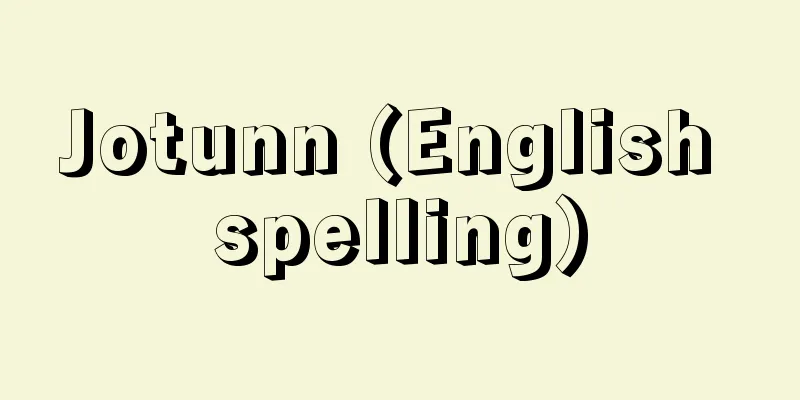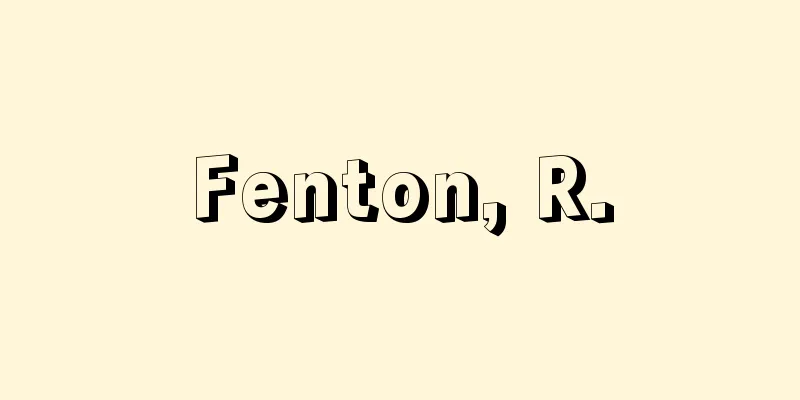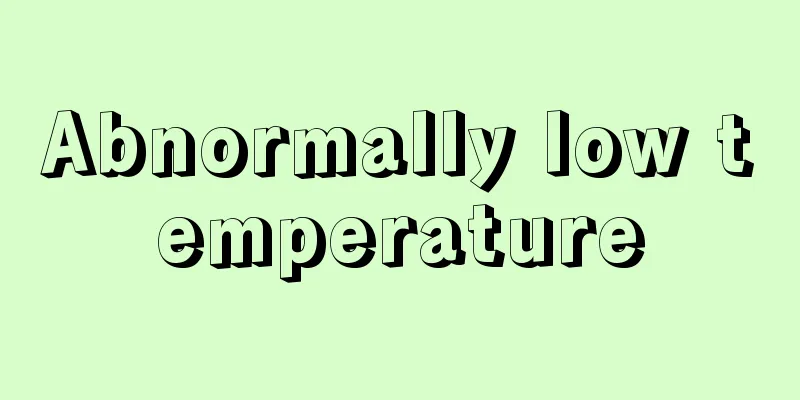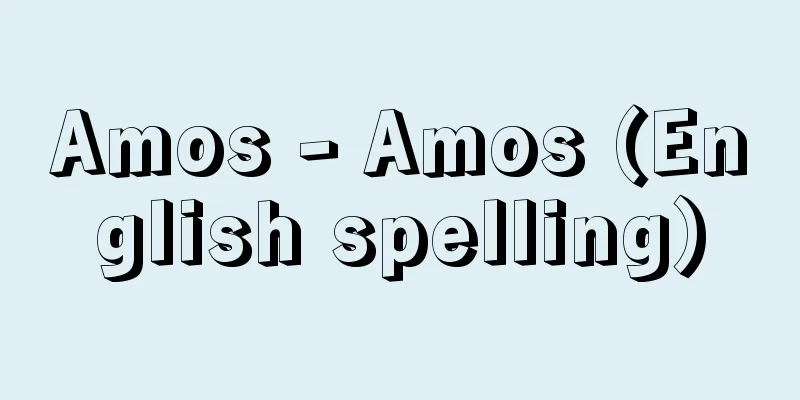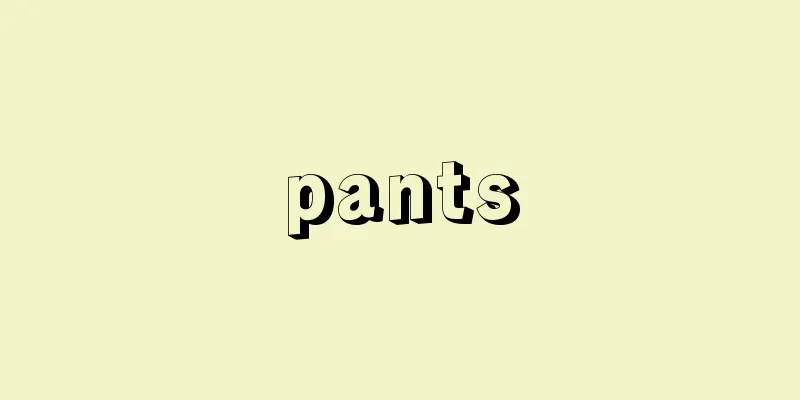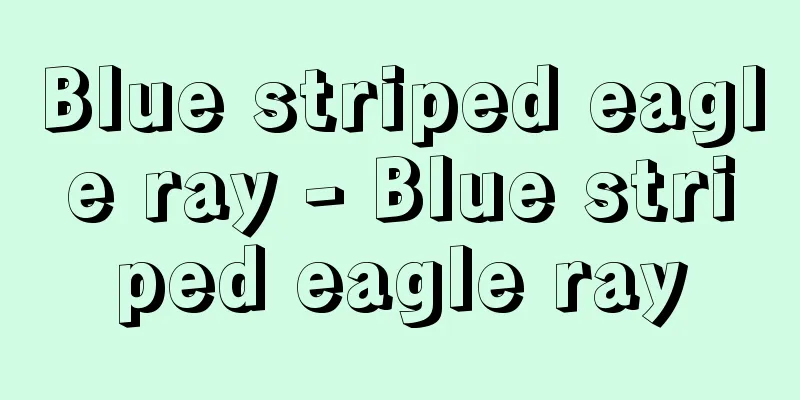Official authority - Shokkenshugi
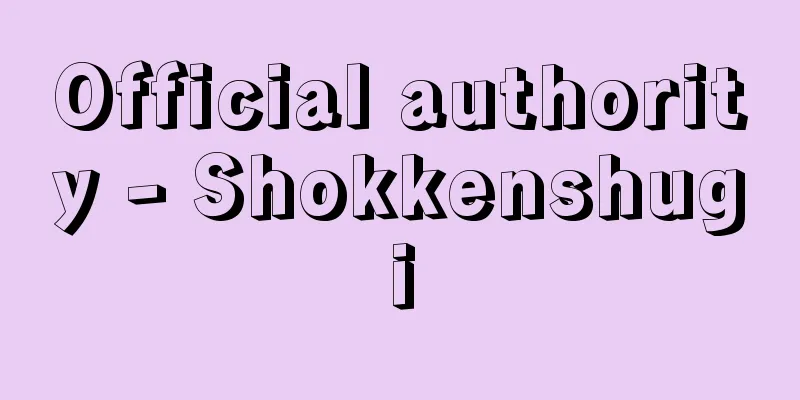
|
This refers to the principle that the court has the initiative in the progress of a lawsuit. It is the opposite concept to the principle of party principle. Official Jurisdiction in Criminal ProcedureUnder the old Criminal Procedure Code (Act No. 75, 1922), the prosecutor submitted investigation records and evidence at the same time as filing charges. This allowed the court to take over the prosecutor's suspicions and conduct a public trial after examining these records in advance. Under this system, the principle of prejudice was not adopted, and the court had the initiative in public trial proceedings, and therefore the principle of ex officio examination of evidence (examination of evidence by the court at its own discretion) was the norm. In other words, the principle was to clarify the truth by ex officio. In contrast, the current Criminal Procedure Code (Act No. 131, 1948), as required by the Constitution and influenced by Anglo-American criminal procedure, introduced the principle of party-based prosecution, adopted the principle of single indictment (the principle that the prosecutor submits only the indictment when filing charges), and left the initiative in the progress of the trial to the parties. However, there are provisions in the current law that adopt the ex officio principle. First, there is the power to direct proceedings (Article 294 of the Code of Criminal Procedure), which recognizes the responsibility of the court to proceed with the proceedings. However, this is an exercise of the court's ex officio power to smoothly proceed with the litigation activities of the parties, and is the inherent authority of the court derived from judicial power. This ex officio principle is distinguished from the ex officio principle that concerns the substantive issues of the proceedings. Next, there is a provision for ex officio examination of evidence (Article 298, paragraph 2 of the same law), which states that the court may examine evidence ex officio when it deems it necessary. When the court examines evidence ex officio to supplement the defendant's ability to defend, it does not conflict with the party principle. On the other hand, the exercise of the court's ex officio power to supplement the prosecutor's procedural actions, if it concerns a criminal fact that has not been prosecuted, goes against the principle of impeachment, which states that it is the prosecutor, not the judge, who has the responsibility to prosecute the criminal fact. Regarding the ex officio examination of evidence regarding the facts of the crime being prosecuted, precedents have clarified the principle of party principle by stating that, in principle, there is no obligation to examine evidence ex officio or to encourage the prosecutor to present evidence, while at the same time stating that, if it is clear that the prosecutor has not submitted evidence due to carelessness, there is an obligation to encourage the prosecutor to submit evidence (Supreme Court First Petty Bench Judgment of February 13, 1958). In addition, there is a provision for an order to change the charges (Article 312, Paragraph 2 of the same law) that the court may order the addition or modification of charges or penal provisions when it deems it appropriate in light of the progress of the trial. From the principle of ex officio principle, since it is the court's responsibility to clarify the truth, it is natural that the court may order the addition or modification of another charge when it cannot find guilt on the current charge. On the other hand, from the principle of party principle, since it is the prosecutor's responsibility to determine the subject of the trial, an order to change the charges is an exceptional system for cases where, for example, the prosecutor does not request a change of charges due to carelessness. Case law has also determined that, in principle, there is no obligation to issue an order to change the charges, but there are exceptional cases where it is clear from the evidence that changing the charges to a sufficiently serious crime would result in a guilty verdict, in which case an order to change the charges is required (Supreme Court Third Petty Bench decision of November 26, 1968). However, even in such cases, the charges will not change unless the prosecutor requests a change of charges in accordance with the order to change the charges. In other words, an order to change the charges has no formative effect (Supreme Court Grand Bench decision of April 28, 1965). Since the discovery of substantial truth is a fundamental principle of criminal procedure, there are cases where the exercise of official authority is necessary to a certain extent, but the issue remains how to harmonize this with the party principle. [Moriichi Taguchi] Official Judgment in Civil LitigationIn civil litigation, the party principle is adopted as a rule, but the official principle is not completely absent. In the history of civil litigation, the relationship between the party principle and the official principle has developed with emphasis on one over the other depending on the era. Currently, the basic direction of the Civil Procedure Law is that the official principle is strengthened and the official progress principle is adopted for the progress of litigation. In addition, the official principle has been introduced and official investigations are conducted for other matters for which the parties are not permitted to take action as a rule. For example, regarding the existence of litigation requirements and the compliance with mandatory provisions, even if there is no request or objection from the parties, or even if the parties approve, the court must investigate and take appropriate measures at its own discretion, without being bound by the parties' attitude, since these are matters related to the public interest. Such matters are called matters for official investigation. Furthermore, among the matters for official investigation, the court can only investigate evidence at its own discretion in matters that are particularly of a strong public interest, and such matters are called matters for official investigation. Matters that are considered to be ex officio investigations include, except for those that are ex officio detection matters among the litigation requirements, such as the requirements for consolidation (Articles 38 and 136 of the Civil Procedure Act), amendment of claims (Article 143 of the same Act), counterclaims (Article 146 of the same Act), and other requirements for claims within a lawsuit, the existence of an arbitration agreement (Article 14, paragraph 1 of the Arbitration Act), the existence of voluntary representation, standing of the parties, the existence of an interest in the protection of rights, and the existence of overlapping lawsuits. These are matters that should be judged based on materials submitted by the parties. Matters that are ex officio detections are particularly of public interest among the litigation requirements, and can be judged by ex officio investigation of evidence even without the parties' claims. The majority opinion is that they include the existence of jurisdiction, exclusive jurisdiction, the existence of grounds for exclusion, the capacity of the parties, the capacity to sue, and the existence of statutory representation. The principle of ex officio detection is adopted in cases of personal status litigation (Article 20 of the Personal Status Litigation Act) and bankruptcy cases (Article 8, paragraph 2 of the Bankruptcy Act). [Takeyoshi Uchida and Tetsuo Kato] [Reference] | | | |Source: Shogakukan Encyclopedia Nipponica About Encyclopedia Nipponica Information | Legend |
|
裁判所が、訴訟進行の主導権をもつ原則をいう。当事者主義の対概念。 刑事訴訟における職権主義旧刑事訴訟法(大正11年法律第75号)では、検察官は公訴提起と同時に捜査記録や証拠物を提出した。これによって裁判所は検察官の嫌疑を引き継ぎ、これらの記録等を事前に検討したうえで公判審理に臨んだ。そこでは、予断排除の原則は採用されず、裁判所が公判審理の主導権をもち、したがって証拠調べも職権証拠調べ(裁判所が職権で行う証拠調べ)が原則であった。すなわち職権による真実の解明を原則とする考え方であった。これに対して、現行刑事訴訟法(昭和23年法律第131号)は、憲法の要請を受け、また、英米刑事訴訟法の影響も受けて、当事者主義の原則を導入し、起訴状一本主義(公訴を提起する際、検察官が提出するのは起訴状のみとする原則)を採用するとともに、訴訟進行の主導権を当事者にゆだねることとなった。 もっとも、現行法にも職権主義を採用する規定がある。まず、裁判所に訴訟進行の責任を認めた訴訟指揮権(刑事訴訟法294条)がある。しかし、これは、当事者の訴訟活動を円滑に進めるための職権発動であって、司法権に由来する裁判所の本来的な権限である。この職権進行主義は、訴訟の実体問題にかかわる職権主義とは区別される。次に、裁判所は、必要と認めるときは職権で証拠調べをすることができるとする職権証拠調べ(同法298条2項)の規定がある。裁判所が、被告人の防御能力を補充するために職権証拠調べを行う場合は、当事者主義と対立はしない。これに対して、検察官の訴訟行為を補充する職権発動は、それが起訴されていない犯罪事実に関する場合は、そもそも、犯罪事実を起訴する職責を有するのは検察官であって裁判官ではないという弾劾主義の原則に反する。起訴されている犯罪事実に関する職権証拠調べについて、判例は、原則として、職権証拠調べをしたり、検察官に対して立証を促したりする義務はないとして当事者主義の原則を明らかにしつつ、同時に、検察官が不注意によって証拠提出を行っていないことが明らかな場合には、検察官に対して証拠提出を促す義務があるとしている(昭和33年2月13日最高裁判所第一小法廷判決)。また、裁判所は、審理の経過にかんがみ適当と認めるときは、訴因または罰条の追加または変更すべきことを命ずることができるとの訴因変更命令(同法312条2項)の規定もある。職権主義の原則からすれば、真実の解明は裁判所の職責であるから、現訴因で有罪を認定できない場合に別訴因の追加または変更を裁判所が命ずることができるとするのは当然ということになる。これに対して、当事者主義の原則からすれば、審判対象の設定はあくまで検察官の任務であるから、訴因変更命令は、たとえば検察官が不注意で訴因変更を請求しないような場合についての例外的な制度ということになる。判例も、原則として、訴因変更命令の義務はないが、相当重大な罪に訴因変更すれば有罪となることが証拠上明らかな場合には、例外的に訴因変更命令の義務があるとした(昭和43年11月26日最高裁判所第三小法廷決定)。ただし、その場合であっても、訴因変更命令にしたがって検察官が訴因変更の請求をしないかぎり訴因は変わらない。つまり訴因変更命令には形成力はない(昭和40年4月28日最高裁判所大法廷判決)。実体的真実の発見は刑事訴訟の根本原則であるから、一定限度での職権発動が必要となる場合もあるが、あくまで当事者主義との調和が課題となっている。 [田口守一] 民事訴訟における職権主義民事訴訟においては、原則として当事者主義がとられているが、職権主義がまったく採用されていないわけではない。民事訴訟の沿革上、当事者主義と職権主義の関係は、時代によりいずれかに重点を置きながら発展した。そして現在では、訴訟の進行については職権主義が強化され職権進行主義をとっているのが、民事訴訟法の基本的方向といえよう。また、そのほかにも当事者の処分が原則として許されない事項については、職権主義を導入し職権調査が行われている。たとえば、訴訟要件の存否や強行規定の遵守の有無については、当事者の申立てまたは異議がなくても、あるいは当事者が承認したとしても、公益に関する事項であることから、当事者の態度に拘束されることなく、裁判所は職権で調査して適当な処置をとる必要がある。このような対象となる事項を職権調査事項という。さらに職権調査事項のうちで、とくに公益性の強い事項に限り職権証拠調べができるのであって、このような事項を職権探知事項といっている。 職権調査事項とされているものは、訴訟要件のうちで職権探知事項に属するものを除き、たとえば併合の要件(民事訴訟法38条、136条)、訴えの変更(同法143条)、反訴(同法146条)その他の訴訟中の訴えの要件、仲裁合意の存否(仲裁法14条1項本文)、任意代理権の存否、当事者適格、権利保護の利益の存否、重複訴訟の有無などである。これらは当事者から提出された資料に基づき判断されるべき事項である。職権探知事項は訴訟要件等のうちで公益性がとくに強く、当事者の主張がなくても職権で証拠調べをして判断できるものであり、裁判権の有無、専属管轄、除斥原因の存否、当事者能力、訴訟能力および法定代理権の有無など、とするのが多数説である。なお、人事訴訟事件(人事訴訟法20条)や破産事件(破産法8条2項)などにおいては職権探知主義が採用されている。 [内田武吉・加藤哲夫] [参照項目] | | | |出典 小学館 日本大百科全書(ニッポニカ)日本大百科全書(ニッポニカ)について 情報 | 凡例 |
<<: Abuse of authority - abuse of authority
Recommend
Faction
...American author T. Capote wrote In Cold Blood ...
Hiruko - Hiruko
In the Kojiki and Nihon shoki myths, this is the ...
Fuji Television Network, Inc. - Fuji Television Network
A private television broadcasting company establis...
Ergonomics - Human factors (English)
What is Ergonomics? Different researchers define ...
Miyagi [Village] - Miyagi
A village in Seta County, central Gunma Prefecture...
Ibn Dāniyāl
1248‐1310 An ophthalmologist born in Iraq and move...
Basket - Curved
〘 noun 〙 A vessel used for drinking sake or water....
Shadow price - Kage no kakaku (English spelling) shadow price
A basic concept in mathematical programming, also ...
Niacin
...(3) Excess Riboflavin is said to be harmless e...
Auerbach, E.
… Based on this reflection, a fierce anti-French ...
Calmette, G. (English spelling) Calmette G
…He was an effective politician who opposed the p...
Yanai [city] - Yanai
A city in the southeastern part of Yamaguchi Prefe...
Ready-made clothing - ready-made clothing
A general term for ready-made clothing, generally...
Nishi-Nippon Railroad
A private railway company. Founded in 1908 as Kyus...
Slaughter - Abandonment
(1) A type of punishment in the Kamakura period. I...

